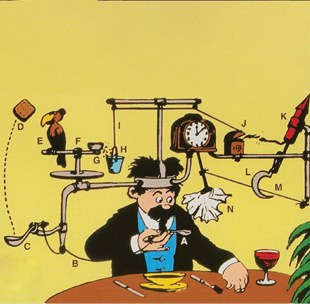Events like Covid-19 are not ‘black swan’. They are ‘black box’ hacks.
Many now strongly believe that Coronavirus is a true black-swan event. “Coronavirus is the black swan of 2020”, “the coronavirus is a black swan event that may have serious repercussions for the US economy and job market”, “Trump faces ‘black swan’ threat to the economy and reelection”, are just few titles to mention. Pundits, politicians, and even people in Silicon Valley increasingly use the notion of black swan to describe the coronavirus pandemic. Speaking to CNBC, Billionaire investor William Ackman speaks about ‘a lot of time’ he spent thinking about coronavirus as a black swan event, something unprecedented with catastrophic effects. The element of unpredictability, which is core to the black swan metaphor, is also appealing many politicians including Trump, as he puts it: “[Coronavirus] is an unforeseen problem. What a problem. Came out of nowhere”.
Employing the metaphor allows politicians and policymakers eschew years of scientific observation, research findings, and experts’ early warnings about the pandemic, and let them to evade their responsibility and find ‘the unprecedentedness’ to blame for their failure. What is happening right now as a global outbreak is not just a product of a random person eats bat soup in Wuhan—a reductionist story that points the finger blame to China. Rather, it is due to an amalgamation of myriad of long-lasting unresolved issues that went ignored in our modern world. Such as increasing disconnection between science and policy-making, as well as lack of forward planning and strategic direction by governments who failed to prioritize problems and actively engage with alternative perspectives.
our age of computers and satellites, our sense of both urgency and fear has become central to the process of addressing social and environmental challenges. This sense of necessity for urgent action can be seen in calls to tackle climate change, biodiversity loss and extinctions, ocean acidification, etc. It comes as no surprise that addressing them should become central to intellectual debates and the rhetoric of politicians.
One popular rhetorical strategy is to depict an apocalyptic scenario to raise awareness and to create a reaction. But the question is whether consciously fostering this image is the best strategy to stop environmental crises. And what are the caveats associated with that strategy? Do we need to be concerned about the issues of power, agency and control in dealing with an environmental problem which comes out of objective science? And if so, what are the concerns, and how they should be addressed?
Before sweeping through the whole world of politics and public policy, the black swan metaphor was firstly popularized among economists who study “unknown unknowns”. Those whose main job is to predict the next big failure in the market. It was first coined by risk engineer Nassim Taleb in his books, Fooled By Randomness and The Black Swan, to characterize highly improbable events that are beyond our imagination.
The metaphor has nothing to do with 2010 Black Swan movie about ballet. It refers to the time Europeans used the black swan expression to call something impossible. A swan without white feathers was impossible or presumed not to exist in Europeans’ system of thought before they arrived in Australia.

No, the pandemic isn’t a black swan
According to Taleb, we can recognize black swan events with their extreme rarity, severe impact, and the predictability in hindsight. Many simply think that Coronavirus pandemic ticks-all-the-boxes. The rational lies behind their hasty conclusion is nothing other than the high level of surprise in the society and unpreparedness in the governments to cope with massive consequences of the incident.
Of course, the event is surprising, but not because we didn’t know it is coming, which we actually did. Rather, it is surprising we didn’t face the problem at the right time, and instead wait for a big failure to occur. Even when the event was unfolding in China and South Korea in February, we did almost nothing to get prepared and take stricter measures to control the outbreak.
This simply indicates we either did not see or chose to ignore the warning signs. Very similar to what we are currently doing with climate change.
The warning signs pointing to the pandemic were many. Bill Gates TED Talk in 2015 called “The Next Outbreak? We’re Not Ready,” which is now going viral in social media is one of them. In this talk, he speaks clearly about the looming threat of a coronavirus pandemic and predicts it’s coming soon. In 2018, he also raised the issue with President Trump and calls on U.S. to lead fight against a pandemic that could kill 33 million. In the same year, the head of the World Health Organization (WHO) speaks about “not some future nightmare scenario”, but a devastating epidemic which “could start in any country at any time and kill millions of people”.
It is not all. Many infectious disease experts for years warned about an upcoming flu pandemic, a one similar to the 1918 flu. In 2018, even a group of experts coined the term “Disease X” to refer to the next pandemic, which would be caused by an unknown, novel infectious agent that hadn’t yet entered the human population. In September 2019, WHO took another step, published a report warning about a coming apocalyptic pandemic killing up to 80 million people, and wiping out almost 5 percent of the global economy.
At the societal level, we the people had also observed several dangerous global outbreaks just over the last two decades like SARS, H1N1, and Ebola.
So, the claim of unpredictability is simply wrong. All these early warning have nothing to do with the black swan’s hindsight bias. And that means, theoretically we can’t call the pandemic a black swan. Because we knew the pandemic is coming soon. But nobody was interested in doing anything about it.
However, the problem with using black swan is more than that. It is on two levels. Policymaking and social change.
First, at the policymaking level, it erases the past to legitimize the present. It provides policymakers with a convenient and safe narrative to frame the pandemic as unpredictable, “coming out of nowhere”. It ‘black boxes’ all the decisions that undermined the efforts to contain the coronavirus outbreak. It simply allows decision makers to avoid public criticism, accountability, and outrage over undue importance given to outbreak surveillance and response. Which means it helps the whole system of governance to continue to be opaque.
Second, but more grave, is the social change. The society is more likely to get paralysed by the fear of unknown, rather inspired by possibilities. The black swan is not an inspiring metaphor to mobilise societies for a total war against our collective indifference, or deliberate negligence, to all the early warnings. It creates an ideal condition of social blankness, leaving the society fully vulnerable to other kinds of threats.
On another point, it also does not highlight the potential of the pandemic as a world-shattering event, which can and will renew the social contracts between state, citizens, and science.
It’s a blackbox hack
It is fair to ask if not black swan what the alternative is. To answer that, let’s think about the key characteristics of the coronavirus pandemic as it spreads in our societies.
The pandemic has already broken the reality of the world we’ve created around ourselves and given meaning to it. It suspends some of our existing mental models and assumptions about government and ourselves. It challenges our expectations, desires, and routines and rituals. We begin to think about its appalling psychic toll, and the ways in which the economy and political system needs to be revisited as a result. In fact, the event opens up the ‘black box’ of our everyday life, right before our eyes—including our personal life, social interaction, politics, and governance.
The term “black box” can represent past, present and also what follows in the future. It is a useful metaphor for asking questions about failures at scale, given its popular meaning in air crashes. The plane’s black boxes help the investigators to figure out what happened. To answer many questions people have about the plan’s failure. The black box is in fact a learning box to prevent similar failures.
The black box metaphor is also used to describe a situation or process we don’t understand—a situation like now that many of us feel trapped in both mentally and physically.
So, it’s fair to say, an expected event like Coronavirus pandemic, which has overwhelmed a society at scale, is a black box event. Because, it urges the society to think seriously about why they did not see or chose to ignore plenty of glary red flags which indicated potential future failure. Asking who is responsible and accountable for spreading ignorance and obfuscating knowledge?
An incorrect but simple way to think of it: a black box event is a black swan many feared.
How can we recognize a black box event? It has four key characteristics:
It Breaks the Routines at Scale. In just the last few days, the impact of the coronavirus has really hit us and disrupted the daily routines of hundreds of millions of people around the world.
It Creates Questions and Challenges Assumptions. Coronavirus has shattered everything: lives, markets, globalization, and the competency of governments and international organisations in preparing themselves for such events. People ask many questions to warp their head around what’s happening and why they suddenly find themselves in home isolation.
It Creates Speculative Futures. People begin to speculate about ‘The World After’—imagining about how things can change for the better and how to prevent future black box type events. For example, Vice magazine imagines a world with free and universal healthcare, protected and empowered labor, a healthier climate, faster and accessible broadband, a public transit that works, a science for the people.
It Creates A New Normal. Like the WWII, the fall of the Berlin Wall, 9/11 attacks, the coronavirus pandemic is an event which will change the world forever. It will create new norms, values, expectations, social roles, and structures. Winners and losers. Leading thinkers from around the world have already started to think about the new normal: lower profits, but more stability; a world less open, prosperous, and free; the end of globalization as we know it. Of course, we’re clearly not out of the woods yet to speculate about the new normal. And like always, it is up to victors to write the history of coronavirus pandemic and shape the new normal.
How to cope with
Not surprisingly, any black box event like what we have experienced so far with coronavirus is fraught with roller-coaster emotions. Along that, this pandemic also pushes us to ask difficult questions and engage actively with the causal relationships that are all too often hidden and not made explicit in our daily life.
Why does the big failure of national governments and international organisations sound normal to us? Why is scientists’ advice has become a hard pill to swallow? Why is it normal to see policymakers and lobbyists put their own political interests ahead of society?, and many more.
Believe it or not, this crippling event has the potential to mobilize communities to think big and act bold about what they want and don’t want. Our actions, and the changes occurring as a result of the pandemic could help tackle other black box events to come.
Most importantly, the ones with climate change.
This article is written in early days of the pandemic, March 2020.



